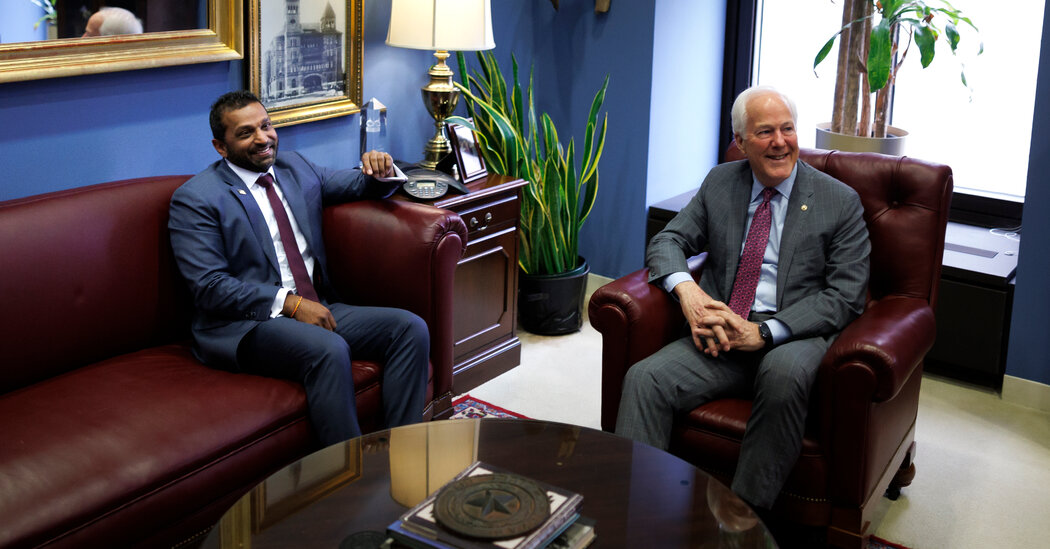Kash Patel, President-elect Trump’s pick to lead the Federal Bureau of Investigation, has called the top ranks of the bureau “a threat to the people” and published a list of enemies, vowing retribution for investigations of top Republicans.
He appears — at least for now — to be on a glide path for confirmation, with Republican senators lining up enthusiastically behind him.
As Mr. Patel made the rounds on Capitol Hill this week ahead of his confirmation hearing, he received almost universal praise from G.O.P. members, even those who had raised concerns about some of Mr. Trump’s other picks.
“Kash Patel is the real deal,” said Senator Thom Tillis of North Carolina, one of the conference’s more moderate members. “President Trump campaigned on the promise to enforce our laws equally and fairly and restore the integrity of the F.B.I.”
Mr. Patel’s warm welcome is fueled in part by an eagerness among Republicans to avoid incurring the wrath of Mr. Trump and his base after a groundswell of anger at Senate pushback to his picks to lead the Pentagon and the Department of Justice, Pete Hegseth and Matt Gaetz.
But it also reflects the extent to which a deep distrust of the F.B.I. has become Republican orthodoxy. Following Mr. Trump’s lead, Republicans in Congress have emerged as the chief antagonists of the bureau, deriding it as an institution rotted by corruption and partisanship.
It is the culmination of a remarkable turnabout that has been years in the making for a party that traditionally had given unyielding support for the nation’s law enforcement agencies. In recent years, Republicans have attacked the F.B.I. for its role in investigating the Trump campaign’s ties to Russia, including its handling of the so-called Steele dossier; accused officials there of failing to investigate issues surrounding Hunter Biden’s laptop; and slammed its leaders for authorizing a raid of Mr. Trump’s Mar-a-Lago home in pursuit of classified documents.
The bureau’s most aggressive attackers on Capitol Hill were once largely confined to the House’s hard-right wing. But as an anti-F.B.I. stance has become a litmus test for Mr. Trump’s base, it is now also widely adopted in the Senate.
Earlier this week, Senator Charles E. Grassley of Iowa, who is in line to chair the Judiciary Committee in the next Congress, called on the current F.B.I. director, Christopher A. Wray, to resign. In a scathing, 11-page letter, he accused the bureau of perpetrating “some of the most egregious, Orwellian conduct I’ve witnessed in my nearly 50 years in the Congress.”
“F.B.I. agents conducted an unprecedented raid of President Trump’s home in Florida to serve a warrant for records,” Mr. Grassley wrote. “In that raid, roughly 30 armed agents entered the home of a former president of the United States, with full authorization to use lethal force if needed to execute its warrant, and even searched the former first lady’s clothing drawers.”
On Wednesday, Mr. Wray said he would step down before the Trump administration took office, in an acknowledgment of Mr. Trump’s desire to replace him.
Mr. Patel carries none of the allegations of personal misconduct that doomed Mr. Gaetz and have threatened to imperil Mr. Hegseth’s confirmation. To oppose him on the basis of his hard-charging ideology would be to oppose Mr. Trump’s own view of the F.B.I. — one of the few political beliefs he strongly holds.
Much of the ire of congressional Republicans mirrors Mr. Trump’s complaints and rhetoric. Both he and Mr. Patel have argued that the bureau’s field agents have been faithfully doing their jobs, but have taken aim at the F.B.I.’s senior leadership in Washington. Mr. Patel has promised to shut down its headquarters in the nation’s capital.
Senator Joni Ernst of Iowa, who is currently in the middle of a firestorm over the confirmation of Pete Hegseth, Mr. Trump’s pick to lead the Pentagon, praised Mr. Patel, saying he would “create much-needed transparency at the F.B.I.”
Senator John Cornyn, a Texas Republican who formerly served as the state’s attorney general, said the erosion of trust in the bureau began years ago with when its former director, James B. Comey, announced just days before the 2016 election that he was reopening an investigation into Hillary Clinton’s use of a private email server.
“That was fundamentally a wrong thing for the F.B.I. director to do; that’s a prosecutorial decision that should have been made by the attorney general,” Mr. Cornyn said. “Of course, that continued when James Comey was fired and then went on a retribution tour to get a special counsel appointed against President Trump. My position is that no one should have to go through what President Trump went through by a partisan Department of Justice and F.B.I.”
Pockets of resistance to Mr. Patel could still emerge. Some senators who have privately expressed qualms about some of Mr. Trump’s nominees have adopted a strategy of keeping quiet and waiting to see what shakes out of their F.B.I. vetting and confirmation hearings.
And Mr. Patel has so far mostly met with senators more disposed to be friendly to him. He has not yet met, for example, with Senator Mitch McConnell of Kentucky, the outgoing Republican leader who has telegraphed that he wants to concentrate on preserving the Senate’s institutional independence.
But few Republican aides expect much in the way of obstruction.
“If you’re going to clean out the F.B.I. and actually get them focused on mission, rather than politics,” Senator Markwayne Mullin of Oklahoma said, “Kash is the perfect person for that.”
